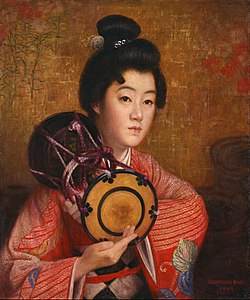| Okada Saburōsuke | |||
|---|---|---|---|
| 岡田三郎助 | |||
 Okada Saburōsuke (1906) Okada Saburōsuke (1906) | |||
| Born | (1869-01-12)12 January 1869 Saga Prefecture, Japan | ||
| Died | 23 September 1939(1939-09-23) (aged 70) Tokyo, Japan | ||
| Nationality | Japanese | ||
| Education | Soyama Yukihiko, Horie Masaaki | ||
| Alma mater |
| ||
| Known for | Founder of Hongō Painting Institute, painter | ||
| Notable work |
| ||
| Style | Yōga | ||
| Awards |
| ||
| |||
Okada Saburōsuke (Japanese: 岡田 三郎助; 12 January 1869, Saga – 23 September 1939, Tokyo) was a Japanese painter in the Yōga style and a professor at the "Tōkyō Bijutsu Gakkō" (School of Fine Arts); precursor of the Tokyo University of the Arts.
Biography
His parents were vassals of the samurai Nabeshima clan. He attended a school that taught western-style painting, under the tutelage of Soyama Sachihiko (曽山幸彦). In 1891, he became a member of the "Meiji Bijutsu-kai" (Fine Arts Society) and, after Soyama's premature death, worked with Horie Moriaki [ja] (堀江正章, 1852–1932), completing his studies in 1893.
That same year, he came under the influence of Kuroda Seiki (黒田清輝} and Kume Keiichiro (久米桂一郎), who had just returned from France. They introduced him the Barbizon school and the concept of plein-air painting. In 1896, he became an Assistant Professor of Yōga art at the Tōkyō Bijutsu Gakkō. He was also one of the founding members of "Hakuba-kai" (White Horse Society); a loosely organized artists' association, supposedly named after their favorite type of sake.
Later, the Ministry of Culture awarded him a stipend to study in France, where he worked with Raphaël Collin. When he returned in 1902, he was named a full professor. Shortly after, he married the daughter of playwright Osanai Kaoru (小山内薫). After 1907, he served as a juror for the annual art exhibition held by the Ministry (the "Mombushō Tenrankai"). In 1912, he and Fujishima Takeji (藤島武二) founded the "Hongo Institute for Western Painting". Seven years later, he was elected a member of the "Teikoku Bijutsu-in" (Imperial Academy of Fine Arts) and was awarded the Order of the Sacred Treasure.
In 1930, the Ministry of Culture sent him to Europe to speak with Hasegawa Kiyoshi and explore the possibility of staging an exhibition of modern Japanese art. Four years later, he was appointed an Imperial Household Artist.
In 1937, Okada received the Order of Culture., the highest honor in the Japanese cultural world. Overall, his art career showed an unusually smooth progression. Okada's painting subjects included both landscapes and portraits, and he was especially good at painting portraits of women. Under his brush, women were portrayed with warm skin textures, elegant features, and delicate traits. In 1907 he won the first prize of the Tokyo Industrial Exhibition for "Image of a Woman (Purple tone)". Later, he exhibited "Women in Red", "Japanese Bush Clover", and the "Portrait of Marquess Ookuma's Wife", establishing his reputation in painting portraits of women.
Selected paintings
-
 Portrait of a Lady
Portrait of a Lady
-
 Portrait of Jirō Okabe (Conservative politician,
Portrait of Jirō Okabe (Conservative politician,
1864-1925) -
 Kimono with Iris Pattern
Kimono with Iris Pattern
-
 Portrait of an Old Man
Portrait of an Old Man
References
- ^ Brief biography @ the Lavenberg Collection.
- ^ Brief biography @ Floating World Gallery.
Further reading
- Nakamura Heisaburo: Okada Saburōsuke. In: Goto Shigeki (ed.): Gendai Nihon no bijutsu (Modern Japanese Prints), Vol.9. Shueisha, 1977.
- Ōsumi, Tamezo:工藝圖譜 : 岡田三郎助蒐集 (Handicraft catalog: Okada Saburosuke's collection), 座右寶刊行會 (Zauhō Kankōkai), 1940.
External links
Categories:- Articles needing Japanese script or text
- 1869 births
- 1939 deaths
- 19th-century Japanese painters
- Yōga painters
- Recipients of the Order of Culture
- Recipients of the Order of the Sacred Treasure
- People from Saga (city)
- 20th-century Japanese painters
- Imperial household artists
- 19th-century male artists
- 20th-century male artists
- Artists from Saga Prefecture